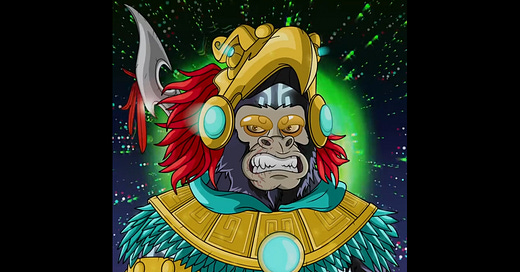
A Historical Perspective On the Latest NFT Insanity
The phrase "slurp juice" makes it seems like we're in the dumbest chapter of human history. But cringe has always been human.
A lotta y’all still don’t get it: Ape holders can use multiple slurp juices on a single ape. Does that mean anything to you? No? Well then you still don’t get it. Instead, you should look at this tweet:
Do you get it now? Do you get it? Do You Get It Now?
I think that I get it. I think that I understand. I understand now that human beings have remained markedly consistent throughout history. We are prone to the stupidest things, to herd behavior that began as an evolutionary response when we realized that we could survive longer and reproduce more by adopting the behavior of our more successful peers. We want what others have; if it is seen as good, then we want it too. For many this is what NFTs, like the ape above, are. If you give them a “slurp juice,” another kind of NFT thing, the ape becomes a different ape. You can use multiple slurp juices on a single ape to create many apes.
That all of this is nonsense—words culled from far-flung corners of internet culture, online gaming, technology, and finance, mashed together with crude artwork—doesn’t matter anymore. This is the world we live in, where thousands if not millions of people get it, they understand and find value in the apes, in the slurp, in the minting events for Lab Monkes and Special Forces.
Earlier today I DM’d Patrick Wyman, perhaps the best source of reliable and broad historical knowledge that I know, to ask him about the slurp. My theory was that the apes and the slurp and the NFTs, while so clearly a strange aberration in the evolutionary progress of the human race, are not the first time human beings have devoted countless man-hours and energy and money to something with no obvious utility or value.
“I firmly believe in the Dumb Guy Theory of History—lots of people have historically done a lot of stupid stuff, bought into all sorts of fads and nonsense, and we tend to either gloss over it or forget it entirely,” Wyman said. “NFTs are a ridiculous framework within which to operate, but the actions of individuals make sense within that framework.”
Wyman then told me about the Tulip Mania of the 1630s, in which Dutch and European artisans and aristocracy went absolutely batshit wild for rare species of tulips, inflating their value to gargantuan proportions until the bubble finally burst toward the end of the decade. Tulip Mania is a common comparison to NFTs, but as Wyman also told me, the true story is less dumb that it sounds. As historian and Tulipmania author Anne Goldgar’s puts it:
Tulip mania wasn’t irrational. Tulips were a newish luxury product in a country rapidly expanding its wealth and trade networks. Many more people could afford luxuries—and tulips were seen as beautiful, exotic, and redolent of the good taste and learning displayed by well-educated members of the merchant class. Many of those who bought tulips also bought paintings or collected rarities like shells.
Prices rose, because tulips were hard to cultivate in a way that brought out the popular striped or speckled petals, and they were still rare. But it wasn’t irrational to pay a high price for something that was generally considered valuable, and for which the next person might pay even more.
In some ways, the NFT craze is similar. Digital assets are newish luxury products in a country incentivized to pursue rapidly-appreciating assets that some people ascribe great value to. It doesn’t matter that most NFTs, like tulips, are going to die and become completely useless both practically and aesthetically. It matters that for a fleeting moment in time human beings like them. There are some differences: As Goldgar points out, Tulipmania was much more rational financial trend than the rapidly evolving, wildly inconsistent Web3 boom. But who’s to say that slurp juice is any stupider than people competing to buy and sell the rarest strain of tulip? Do I personally think it is stupider because tulips are pretty and all NFTs look like dogshit? Sure. But what rapid advances in mass communication have done is emphasize the inherent stupidity of the vast majority of things people do every day, not increase it. We may have more opportunities to slurp the juice these days, but in the end, our apes haven’t evolved that much at all.















slurp
my favorite argument against constitutional originalism is that if you told george washington about any of this shit, he would just immediately shoot you with a gun